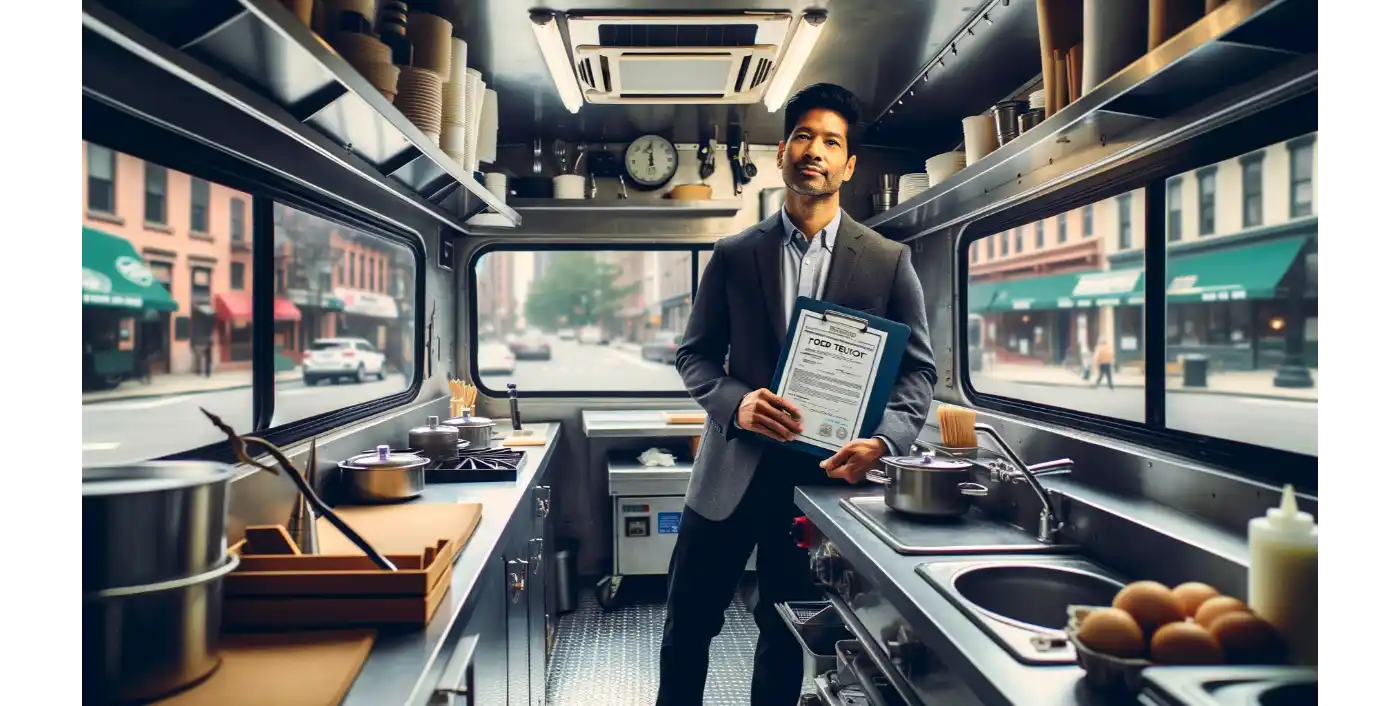Obtaining Food Truck Business Licenses And Permits Made Simple
Starting a food truck business can be as exciting as it is complex. One of the trickiest parts? Navigating the maze of required licenses and permits. But worry not, fellow entrepreneurs.
With the right information and a bit of patience, you can easily get your food truck up to code and ready to serve up delicious fare to eager customers.
Let’s dive in!
What are Licenses and Permits?
First things first, let’s clear up what we mean by “licenses and permits“. Essentially, these are legal documents that grant you permission to operate your food truck business in a particular location. They ensure your business complies with local, state, and federal regulations.
Common ones include a business license, mobile food vending license, health department permit, and fire safety permit.
Federal Licenses and Permits
Getting Your Employer Identification Number (EIN)
The first thing you’ll need is an Employer Identification Number (EIN). This is like a social security number for your business, allowing you to open a bank account, hire employees, and register with the IRS.
Getting an EIN is straightforward. You simply go to the IRS website, fill out the online application with your business info, and voila! You’ve got your EIN.
Remember to print or save the confirmation letter for your records.
Food Safety Certification
Next, you’ll need a Food Safety Certification. This proves you know how to safely handle food and prevent food-borne illnesses. Look for an accredited program that meets FDA standards, register, pay the fee, and complete the course.
Here are some Food Safety Certification programs for food truck operators
- StateFoodSafety: ANAB-accredited, complete online, includes practice tests and study guide, online or in-person proctored exam.
- MyFoodServiceLicense.com: CFPM course, online course and exam, nationally accredited.
- ANSI-CFP Accreditation Program: Various accredited organizations, including the International Certified Food Safety Manager and ServSafe® program.
- TPC Training: ANSI-accredited, interactive online programs through eFoodHandlers & StateFoodSafety.
- NSF International: Offers a range of in-person and online food safety courses
Once you pass the final exam, you’ll receive your certificate. Don’t forget to display it proudly in your food truck!
Registering with the FMCSA
If your food truck will be crossing state lines, you’ll need to register with the Federal Motor Carrier Safety Administration (FMCSA). This ensures you comply with federal safety regulations. Fill out the online registration form on the FMCSA website, pay the fee, and you’ll receive a unique USDOT and MC number to display on your food truck.
A word of caution here: make sure to update your registration every two years or whenever your information changes. Ensure you’re following federal safety standards and have proper insurance coverage. Avoiding these common mistakes can save you from hefty fines or lawsuits.
Selling Alcohol? Get a TTB Permit
If you plan to sell beer, wine, or liquor from your food truck, you’ll need to secure a permit from the Alcohol and Tobacco Tax and Trade Bureau (TTB). The application process requires submitting your business and alcohol information, and then patiently waiting for approval. Once you get your TTB permit, display it in your food truck.
Remember to check your local laws regarding alcohol sales as they vary widely. Also, it’s crucial to keep track of your alcohol inventory, sales, and taxes. Staying on top of these tasks can save you from audits or fines.
State Licenses and Permits
1. The Sales Tax Permit: Your Ticket to Trade
First things first, you’ll need a sales tax permit. This essential document allows you to collect and remit sales tax on your goods and services. Getting one is simple:
- Head to your state’s Department of Revenue or Taxation website.
- Look for the “Register for a Sales Tax Permit” option and click it.
- Fill out the online form with your business details, including your name, address, and EIN.
- Pay the associated fee and voila! You’ve got your permit.
However, beware of common pitfalls. Start by registering for a sales tax permit before you begin selling. This helps you avoid penalties and interest charges. Regularly file your sales tax returns and keep abreast of your sales tax rates. Remember, these can vary by state, county, city, and even product.
2. Vehicle Registration: Your Passport to the Road
Next up, your food truck needs to be registered. This proves ownership and compliance with local safety and emission standards:
- Visit your state’s Department of Motor Vehicles (DMV) website.
- Click on “Register a Vehicle”.
- Fill out the form with your vehicle details (make, model, year, and VIN).
- Pay the fee and your registration and license plate are all set.
Avoid common mistakes such as not registering your vehicle within the required time frame and neglecting to renew your vehicle registration. Keep your details up-to-date to avoid invalid or incorrect information.
3. A Driver’s License: The Key to Mobility
As a food truck owner, you’ll need a driver’s license to navigate public roads:
- Visit your local DMV office with your proof of identity, residency, and insurance.
- Fill out the driver’s license application form.
- Pay the fee and take your written and road tests.
- Once you pass, your driver’s license is yours to keep.
Remember to study for your tests, follow traffic rules, and renew your license before it expires.
4. Specialty Licenses: Catering to Niche Needs
Depending on your state or business concept, you might need additional licenses such as a liquor license, catering license, or vending machine license. Always check with your state’s Department of Revenue, DMV, and Department of Health to ensure you’ve covered all your bases.
County Licenses and Permits: The First Steps
Before you can start tantalizing taste buds with your tantalizing tacos or perfect pizzas, you need to obtain several county licenses and permits. These include a Health Department Permit, Fire Safety Permit, and Zoning Permit.
1. Health Department Permit: Keeping It Clean
The Health Department Permit is your ticket to showcasing your commitment to health and sanitation. You’ll need to contact your local health department, schedule an inspection, and pass with flying colors. Remember, neglecting to prepare your truck for the inspection or violating health department regulations could result in fines or even closures.
2. Fire Safety Permit: Turning Up the Heat Safely
Next, you’ll need a Fire Safety Permit. This involves another inspection, this time by a fire marshal who will scrutinize your fire safety equipment like a hawk. Avoid the common pitfalls of neglecting to install or maintain proper fire safety equipment and not following fire safety regulations.
3. Zoning Permit: Finding Your Spot
Finally, your Zoning Permit is what allows you to park and operate your food truck within certain county areas. This process involves applying your business and vehicle information and adhering strictly to the rules and restrictions outlined in your permit.
City Licenses and Permits: The Next Level
Once you’ve navigated the county maze, it’s time to tackle the city licenses and permits. This includes a Business License, Mobile Food Vending License, and Parking Permit.
1. Business License for Food Trucks: Setting up Shop
Your Business License is what officially allows you to operate your food truck within the city. This involves filling out an online application form with your business information and paying the associated fees.
Your financial responsibilities encompass both the business license fee and registration costs. These amount to around $50 upfront and vary annually, depending on your state’s regulations and the restaurant’s revenue.
Look out for city-specific requirements that may affect your operation.
2. Mobile Food Vending License: Serving Deliciousness
With your Mobile Food Vending License, you can legally sell your delicious food from your truck. Similar to the business license, this involves an online application and fee payment.
The cost of a mobile food vending license for a food truck varies depending on the location. In South Carolina, for example, the cost of a public health permit/license can range from $100 to over $1,000, depending on the county
Ensure you apply for this license before you start selling to avoid fines.
3. Parking Permit for Food Trucks: Claiming Your Spot
Last but not least, you’ll need a Parking Permit to park and operate your food truck in certain city areas. This process involves another online application form and fee payment. The cost of food truck parking/storage ranges from $200 to $1000 per month.
Make sure you research and respect the parking laws and regulations to prevent tickets or complaints.
Operating By the Book: A Food Truck’s Guide to Licensing
Just like a maze, the process of obtaining all the necessary licenses and permits may seem daunting at first. But with the right information, a bit of patience, and a dash of perseverance, it’s a puzzle you can solve.
Remember, it’s not just about getting these licenses and permits, but also about maintaining them. Keep them up-to-date and renew them before they expire. This way, you’ll keep your food truck rolling smoothly on the road to success.
So, are you ready to navigate the maze of food truck licenses and permits? Let’s get your food truck venture rolling! Any questions or thoughts on the process? Feel free to share in the comments section below.






